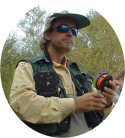 Though they all share similar motivation, there are different types of “teachers.” The way they transmit their knowledge differs substantially. Each has advantages and disadvantages and their styles are completely different. Being aware of their differences helps you to know what to do and how to get the most out of what each has to offer. The main profiles are: the Scholars, the Magic-formulas, the Look-how-I-do-its and the Teachers.
Though they all share similar motivation, there are different types of “teachers.” The way they transmit their knowledge differs substantially. Each has advantages and disadvantages and their styles are completely different. Being aware of their differences helps you to know what to do and how to get the most out of what each has to offer. The main profiles are: the Scholars, the Magic-formulas, the Look-how-I-do-its and the Teachers.
Those of the first group, the scholars, know a lot. A lot about everything. And they tell you. With them, you can learn oodles. Or nothing. Depending on your capacity to comprehend, analyze and synthesize, you can either get lots of knowledge from these fishermen or be very disappointed. A pocket notebook or even a vest-size recorder can come in handy. Don't hesitate to say, “I don't get you. Could you say it again, please?” Though they seem circumspect, they're actually quite easy to connect with.
The Magic-formulas get straight to the point. “Use this fly. A five weight is the best. Get up on that rock. This brand of tippet is much better.” Etc. This group is very pragmatic. You've got a problem. Do this and it's solved. With this kind, it's better to listen and say nothing. Why's are superfluous. Alternative solutions don't exist. They're usually very nice, friendly guys.
The third group, the Look-how-I-do-its, can't provide very technical explanations. They don't know why they do what they do. This is how it's done because this is how I do it. They like to be watched and give the impression of trying to make things more difficult than they are. They don't want you to understand what they do; they just want you to do it. The amount of things they can teach is certainly limited but their lessons are unforgettable. And they're often a hell of a lot of fun.
Lastly, we have the so-called Teachers. They're innate pedagogues, capable of simplifying the most complicated things so even the slowest novice can assimilate them. They pose only one problem. They like to teach and they want to teach. A practical-theoretical lesson on how to dry your waders so they'll smell like roses can get a bit tedious.
I think teaching is one more aspect of the myriad ways to experience fly fishing. As Izaak Walton said:
“The true teacher never over-teaches. He gives hints and advice and often is simply there. The learner ends up realizing he wasn't doing that to safeguard his secrets, but rather to protect the immense pleasure that comes from discovering things for oneself.”











